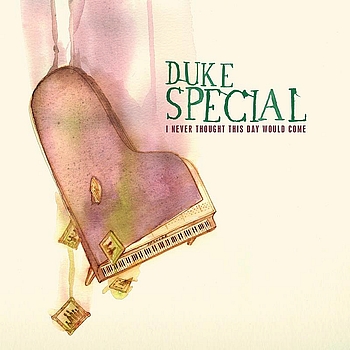Aidan Curran posted on November 10, 2008 18:00
A review of the album 'I Never Thought This Day Would Come' by Duke Special
 Review Snapshot: While never consistently matching the dizzy heights of previous album 'Songs From The Deep Forest', Peter Wilson still makes a convincing tilt at the title of Ireland's Best Songwriter. A few Duke-Special-by-numbers numbers aside, mostly collaborations, his new album contains more of the same catchy, heartfelt piano-pop with which he's now synonymous. A consolidation, then.
Review Snapshot: While never consistently matching the dizzy heights of previous album 'Songs From The Deep Forest', Peter Wilson still makes a convincing tilt at the title of Ireland's Best Songwriter. A few Duke-Special-by-numbers numbers aside, mostly collaborations, his new album contains more of the same catchy, heartfelt piano-pop with which he's now synonymous. A consolidation, then.
The Cluas Verdict? 7 out of 10
Full Review:
Not to burden the new Duke Special album with impossible expectations or anything, but Peter Wilson’s previous long-player, ‘Songs From The Deep Forest’, was simply astounding. Bursting with baroque ambition, soaring joy, searing heartache, witty poetry, warm sincerity and catchy tunes, it’ll soon be permanently camped on the upper slopes of Mount Best Irish Album Ever. (If not, it’ll be because of the drippy single mix of ‘Freewheel’, for which someone should be fired.)
So, the follow-up, then.
Well, while not topping or matching its illustrious predecessor, ‘I Never Thought This Day Would Come’ is still a very good album. With it, Wilson continues a fine strand of work and consolidates his reputation as a Champions League-level pop songwriter.
It falls short of greatness because it can’t keep up the consistent emotional, lyrical and musical density of ‘Songs From The Deep Forest’. Simpering second track ‘Sweet Sweet Kisses’ shares a melody with ‘She’ll Be Comin’ Round The Mountain’ and is just as repetitive and flimsy. ‘Flesh And Blood Dance’ feels like a photocopy of ‘Portrait’ off the previous album. And if ever a song sounds like hard work just from its title, then it’s ‘These Proverbs We Made In The Winter Must End’. A track co-written with, of all people, Bernard Butler, that title is the catchiest bit. Exactly.
(Butler, of course, famously walked out on Suede’s ‘Dog Man Star’, another baroque pop masterpiece whose frosty darkness complements Wilson’s sunnier disposition.)
But there’s plenty to be positive about on this album. Wilson, like Paul McCartney, seems genetically designed to write (or co-write, as is more often the case on this album) tunes that’ll be whistled by postmen and bus drivers the world over. It’s surely no accident that, like all radio-friendly pop songwriters, he usually makes the title the lyrical hook of his songs.
And though we complained above that this album can’t match the power of its predecessor, there are still plenty of memorable moments. It’s hard to dislike the bruised optimism of opening track ‘Mockingbird Wish Me Luck’ and the subversive cynicism of the title song (whose punchline is given away by its own subtitle).
Best of all are two tearjerkers that rate among Wilson’s finest songs. It’s hard to convey the emotional wallop of Wilson singing simple lines like the title lyrics of ‘If I Don’t Feel It’, ‘Why Does Anybody Love?’ and ‘Nothing Comes Easy’. If you listen to them on the bus to work tomorrow morning, good luck convincing fellow passengers that you’ve just been chopping onions. Like poor old Elliott Smith, Wilson has the knack of marrying bleak sentiment with gorgeous melody. And his voice, that vivid Belfast accent, is still his ace: the implicit touch of sincerity and individuality that has us trusting the emotions he evokes.
If we’ve gone on too much about Wilson’s previous album, that’s because the man has set a dizzyingly high standard and we want him to maintain it on this new record. He doesn’t always succeed, but now we know that a good Duke Special album is better than most people’s best. Go on, son – write that next record all by yourself and make it blow our minds.
Aidan Curran
More ...
[Read More...]